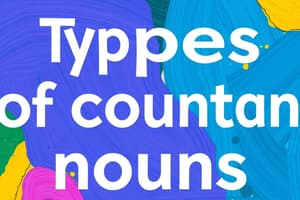Podcast
Questions and Answers
What is the difference between common nouns and proper nouns?
What is the difference between common nouns and proper nouns?
Common nouns refer to general people, places, things, or concepts, while proper nouns are specific names that uniquely identify particular entities.
Give an example of a countable noun.
Give an example of a countable noun.
book
Give an example of an abstract noun.
Give an example of an abstract noun.
Love
Provide an example of a non-countable noun.
Provide an example of a non-countable noun.
What do concrete nouns refer to?
What do concrete nouns refer to?
What types of entities do proper nouns uniquely identify?
What types of entities do proper nouns uniquely identify?
Provide an example of a collective noun.
Provide an example of a collective noun.
How do countable nouns differ from non-countable nouns?
How do countable nouns differ from non-countable nouns?
What is the function of possessive nouns?
What is the function of possessive nouns?
What category do abstract nouns fall into?
What category do abstract nouns fall into?
Give an example of a compound noun.
Give an example of a compound noun.
What distinguishes gerunds from gerundive nouns?
What distinguishes gerunds from gerundive nouns?
Study Notes
Understanding Nouns: Categorizing Words that Name
Nouns are a vital part of the English language, as they serve to name people, things, ideas, and concepts. In this article, we'll delve into the different types of nouns and the roles they play in our daily communication.
Common vs. Proper Nouns
The most fundamental distinction in nouns is between common nouns and proper nouns.
Common nouns refer to general people, places, things, or concepts, such as "dog," "table," "city," or "happiness."
Proper nouns, on the other hand, are specific names that uniquely identify particular entities, including people, places, and ideas, such as "John," "New York," or "Apple Corps."
Countable vs. Non-countable Nouns
Another classification of nouns is based on whether they can be counted or not.
Countable nouns, like "book," "chair," or "car," refer to items that we can count and quantify.
Non-countable nouns, on the other hand, are items that are not typically counted, such as "milk," "rice," or "furniture." These are usually considered as mass nouns, where the quantity is measured rather than counted.
Abstract vs. Concrete Nouns
Abstract nouns refer to things that cannot be touched or seen, such as "love," "hope," "justice," or "freedom."
Concrete nouns, conversely, refer to things that can be seen, touched, or measured in some way, such as "tree," "rock," "wind," or "sunshine."
Collective Nouns
Collective nouns refer to groups of things or people as a whole, such as "class," "family," "team," or "audience." These nouns can be counted or non-counted, singular or plural, depending on the context.
Possessive Nouns
Possessive nouns indicate ownership or possession, such as "John's car," "the city's park," or "her book."
Compound Nouns
Compound nouns consist of two or more words joined together to form a new word, such as "mother-in-law," "ski resort," or "coffee maker."
Gerunds and Gerundive Nouns
Gerunds and gerundive nouns are derived from verbs and have a special function as nouns. Gerunds end with the suffix "-ing" and function as nouns to refer to actions, such as "walking," "swimming," or "laughing." Gerundive nouns end with the suffix "-able" or "-ible" and indicate the capacity or ability of a noun, such as "helpful," "lovable," or "cookable."
Conclusion
Mastering the different types of nouns will help you understand the English language in greater depth, develop a more articulate and precise vocabulary, and allow you to understand the nuances and subtleties of English grammar and usage. Keep exploring the vast world of nouns, and you'll find that there's always something new to learn!
Studying That Suits You
Use AI to generate personalized quizzes and flashcards to suit your learning preferences.
Description
Explore the various types of English nouns, such as common vs. proper nouns, countable vs. non-countable nouns, abstract vs. concrete nouns, collective nouns, possessive nouns, compound nouns, and gerunds. Enhance your understanding of how nouns name people, places, things, and ideas in the English language.




